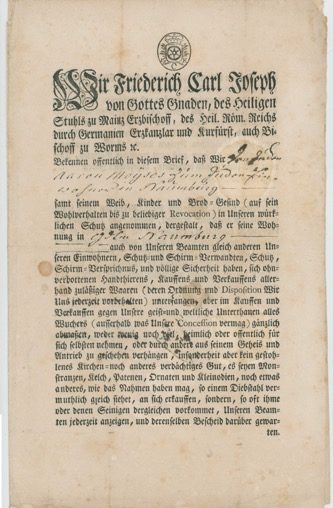Rebecca Forgasz was the Director & CEO of the Jewish Museum of Australia for nearly ten years. This extract of her farewell lecture, Ten tantalising tales: stories from our collection, is part of a series published here to mark the High Holidays. In each instalment Rebecca reflects on the personal, collective and cultural significance of objects and the collections that house them.
#1 German Concession
This is one of those objects that for me represents the thrill of Jewish history lessons coming to life! It is an example of the incomparable immediacy of the historical artefact—the simple “wow-factor” of the “real thing” sitting there in front of you. It is a document that relates to the status of Jews in medieval Europe.
At school and at university, I learnt about the status of Jews in the Middle Ages—how they had to be granted permission to be able to live in the lands ruled by Christians. They also had to pay higher taxes simply to trade, work, or even to get marriage, birth or death certificates. These were ‘privileges’ for Jews, not rights, as they were seen as 2nd class citizens.
Some places insisted that Jews had to wear identifying clothing and signs to make it clear to the general public that they were Jews while others restricted the number of Jewish families. So, for example, in some German states, when a young Jewish man wanted to get married and start a family he could not stay in the same town as his parents and may have to move and find a new town that would accept him.
It was exciting for me to discover this document displayed in our Timeline of Jewish History gallery—real material evidence of what I had read in text books, which otherwise seemed distant and abstract. The document is a permit granting Aaron Moyses and his household the permission to reside in Naumburg to trade and buy good and food and to be protected—if Aaron pays the annual fee. Imagine to have to get special permission just to live somewhere earn a livelihood—things that we take for granted.
Jews of this part of Germany, or the kingdom of Prussia as it was then, could not take these things for granted until they were emancipated in 1812, when an edict was issued recognising all Jews already resident by virtue of privileges and “special concessions” as citizens of Prussia. The edict abrogated all limitations on Jews’ rights of residence and commerce, all special taxes, and in general, all special laws relating to the Jews.
Concession Form
1775, Germany
Paper, ink, 445 x 332mm
Donated by Annie Spittell
Jewish Museum of Australia Collection 198.1


Comments are closed.